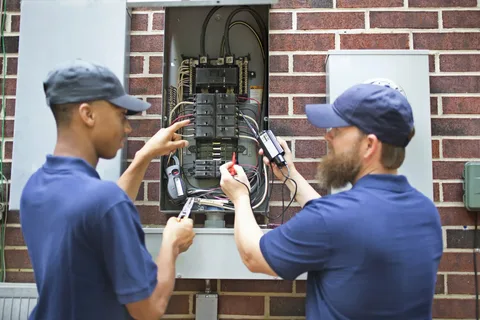Electricity is an integral part of modern homes, powering our appliances, lighting, and various electronic devices. While it’s a convenience, it’s crucial to prioritize electrical safety to prevent accidents and ensure a secure living environment. Here are 10 essential electrical safety tips for homeowners to follow:
1. Regular Electrical Inspections
Schedule regular electrical inspections for your home. A professional electrician can identify potential issues, check the condition of wiring, and ensure your electrical system meets safety standards. This proactive approach helps prevent problems before they escalate.
2. Install Ground Fault Circuit Interrupters (GFCIs)
GFCIs are essential in areas where water is present, such as kitchens and bathrooms. These devices detect fluctuations in electrical currents and quickly shut off power to prevent electric shocks. Ensure that GFCIs are installed in the right locations and test them regularly.
3. Upgrade Outdated Wiring
If your home has outdated or faulty wiring, consider upgrading to modern, safer alternatives. Old wiring can pose fire hazards and may not meet the demands of modern appliances. Consult with a licensed electrician to assess and upgrade your wiring if necessary.
4. Use Professional Electricians
For any electrical work, hire licensed and experienced electricians. DIY electrical projects can be dangerous and may lead to faulty installations. Professional electricians follow safety protocols, ensuring the work is done correctly and up to code.
5. Avoid Overloading Outlets
Overloading outlets with multiple devices can lead to overheating and electrical fires. Use power strips with built-in surge protectors to expand outlet capacity safely. Be mindful of the power requirements of your devices and appliances.
6. Regularly Check Electrical Cords
Inspect electrical cords for fraying, damage, or exposed wires. Replace any damaged cords immediately. Avoid running cords under carpets or furniture, as this can cause overheating. Use cord organizers to manage multiple cords safely.
7. Be Cautious with Extension Cords
While convenient, extension cords should be used temporarily. Avoid using them as permanent solutions, and never daisy-chain multiple extension cords together. If you need additional outlets, consider installing them professionally.
8. Keep Water Away from Electrical Devices
Water and electricity don’t mix. Keep electrical devices away from water sources to prevent electric shocks. Install waterproof covers on outdoor outlets and ensure that electrical appliances are kept dry.
9. Install Smoke Detectors
Smoke detectors are crucial for early detection of electrical fires. Install smoke detectors in key areas of your home, such as bedrooms and hallways. Test them regularly and replace batteries at least once a year.
10. Educate Family Members on Safety Protocols
Ensure that everyone in your household is aware of basic electrical safety protocols. Teach family members not to overload outlets, unplug appliances when not in use, and recognize the signs of electrical issues, such as flickering lights or burning odors.
Conclusion
Prioritizing electrical safety is essential for homeowners to protect their families and property. Regular inspections, professional assistance, and following safety guidelines can prevent accidents and create a secure home environment. By incorporating these 10 essential electrical safety tips, homeowners can enjoy the benefits of electricity while minimizing risks.
Frequently Asked Questions
- How often should I schedule electrical inspections for my home?
- It’s recommended to schedule electrical inspections every 5 to 10 years or when purchasing a new home. However, if you notice electrical issues, it’s advisable to schedule an inspection promptly.
- What are the signs of outdated or faulty wiring in a home?
- Signs include flickering lights, frequent tripped circuit breakers, discolored outlets, or a burning smell. If you notice any of these signs, consult with a licensed electrician.
- Can I use extension cords for permanent solutions?
- No, extension cords are designed for temporary use. If you require additional outlets, consult with a professional electrician to install them safely.
- How often should I test smoke detectors?
- Test smoke detectors monthly and replace batteries at least once a year. It’s also recommended to replace smoke detectors every 10 years.
- What should I do if I experience an electrical emergency?
- In case of an emergency, such as sparks, smoke, or an electrical fire, shut off power at the breaker panel if safe to do so, and contact emergency services immediately.



